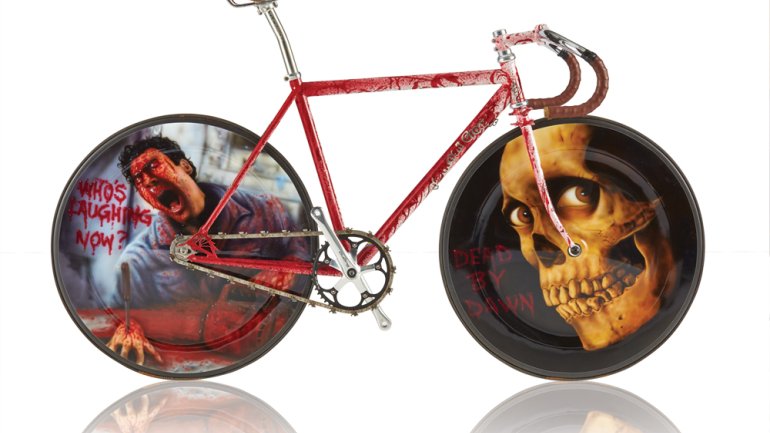Total Overhaul
Total Overhaul
Erik Noren’s bicycle designs aren’t just flashy; they’re also built beautifully.
What is a Highlander bike? Actually, make that “the” Highlander bike, per the tagline of the 1986 film: “There can be only one!” Once you’ve accepted the notion of crafting an ultra high-end custom bicycle around a cult movie – builder Erik Noren, of Peacock Groove, also made an Evil Dead bike a couple of years ago – you might move on to appreciate the Highlander’s tartan graphics and details such as the intricate cutouts in the seat tube. You might also be drawn to the lines of its frame: unusual to the casual observer, astonishing for frame-building insiders.
Finally, you might try to comprehend spending thousands or even $10,000 for a custom-made bike. But, in fact, thousands or even tens of thousands of people are eager to do so. From gravel racing and bikepacking to fat-tire winter cycling and showpieces such as the Highlander, the appeal of bikes has expanded into an array of niches in recent years. Meeting that demand is a cadre of custom frame-builders, many of whom meet up annually at the North American Handmade Bicycle Show. Founded in 2005, the NAHBS honors about 15 bikes among hundreds of entries; this year, the President’s Choice award went to Noren’s Highlander.
In keeping with the Peacock Groove name, Noren has a reputation as a brash standout. His penchant for elaborate stainless steel adornments and flashy paint jobs worthy of a hot rod is at odds with a long tradition of staid, even minimalist aesthetics in bike design and graphics. “In certain circles I’ve been mocked for this stuff,” says the St. Paul native, who bikes most days to his studio across the Mississippi River in Minneapolis. “Not that I care, but it’s interesting, now that it’s growing more popular.”
In addition to cult movies, Noren’s flamboyant designs and themes borrow from pop culture and kitsch, heavy metal, and Japanese anime: He painted one of his personal bikes with Fruit Stripe gum graphics; another is themed around a favorite Motörhead song. As for the Evil Dead bike, its notoriety was aptly summed up by a commenter on the Bike Rumor website. He deemed the splattered-blood graphics “banal, sickeningly trendy, [and] in poor taste,” but also called Noren “one of the most inspired and skilled bike builders in the entire country. His design and welding skills are stupendous.”
Those skills first came to light in the early ’90s, when Noren quit a job as a soda jerk to become a welder at Minneapolis’ Croll Cycles. While Croll didn’t last long as a business, founder Walter Croll gained a devoted following for his custom road bikes with eye-catching paint jobs and steel tubing from Reynolds, a British company dating back to 1898. For his Highlander, Noren chose a rare steel tube set that was only briefly produced in the ’80s by Columbus, an equally respected Italian manufacturer. He upped the ante when, as he describes it, he “threw everything out, stripped it to nothing, and rebuilt it to be everything.”
Don Walker, NAHBS founder and president, says Noren’s virtuoso display of skill spoke to him as he considered which bike to award. “The design of it and the execution, especially for TIG welding … what he’d done had, to my knowledge, never been done,” he says.
“Some people like flash; others like form and function,” Walker continues. “For years now we’ve called Erik the Liberace of bicycle frame building. He obviously enjoys being flamboyant, but he can also be subtle. He’s always had a good eye for design, but now he’s stepping up his game with his details and getting recognition for his craft.”
Indeed, whether it’s renown or notoriety, Noren is becoming better known nationally, and even internationally, having taken recent commissions from cyclists in Singapore and New Zealand. For those who can’t afford an $8,000 bike, he is introducing a line of $180 headsets (for non-initiates, that’s a part that allows the rider to steer), a move intended to make Peacock Groove more financially sustainable. At the same time, he aims to boost his environmental quotient by using bike couriers to transport materials and products, while reinforcing his commitment to the Twin Cities’ bike community.
Noren is proudly unapologetic about the superiority of bikes over motor vehicles, a stance that, like many of his opinions, is expressed in language as colorful as his paint jobs. Ultimately, though, his devotion to his craft stems more from a heartfelt idealism about bikes and their role in a community. “A buddy says bikes are freedom,” he says. “They really are; they’re so liberating.”
Julie Caniglia is a writer in Minneapolis.

